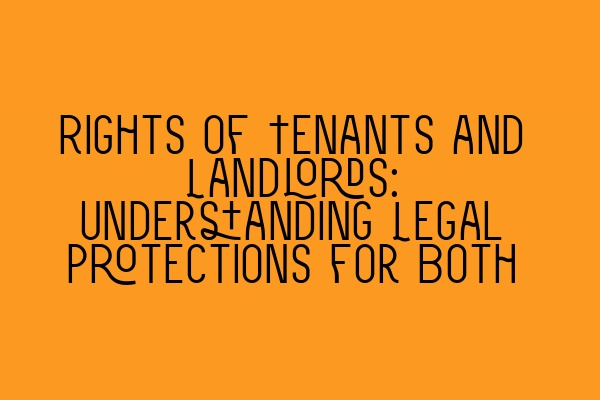As a solicitor specializing in property law and land law, it is crucial to understand the rights and legal protections afforded to both tenants and landlords. Whether you are a tenant seeking clarity on your rights or a landlord interested in understanding your legal obligations, this blog post will delve into the topic and provide valuable insights.
Before we dive into the nitty-gritty details, it is important to note that the laws governing tenant and landlord rights may vary depending on the jurisdiction you are in. Therefore, it is advisable to consult with a professional solicitor, like those at SQE Property Law & Land Law, to obtain accurate and up-to-date legal advice specifically tailored to your situation.
Now, let’s explore the rights of tenants and landlords, highlighting the legal protections each party enjoys.
Rights of Tenants
1. Right to a Habitable Property: As a tenant, you have the right to live in a property that meets certain standards in terms of safety, cleanliness, and general habitability. Landlords are legally obligated to ensure that the property meets these standards and make necessary repairs promptly.
2. Right to Privacy: Tenants have a right to privacy in their rental property. Landlords must provide advance notice before entering the premises for non-emergency purposes, respecting the tenant’s right to enjoy the property without unnecessary intrusion.
3. Right to a Fair Rental Agreement: Tenants are entitled to a fair and reasonable rental agreement. This includes providing clear terms and conditions, outlining the responsibilities of both parties, and adhering to local laws regarding rent increases, security deposits, and lease termination.
4. Right to Sue for Discrimination: Discrimination of tenants based on race, ethnicity, gender, religion, disability, or other protected characteristics is unlawful. Tenants have the right to take legal action against landlords who engage in discriminatory practices.
5. Right to Retaliation Protection: If a tenant asserts their legal rights, such as filing a complaint about unsafe living conditions, they are protected from retaliation by the landlord. It is illegal for a landlord to evict or retaliate against a tenant for asserting their rights.
Rights of Landlords
1. Right to Collect Rent: Landlords have the right to collect rent from their tenants as stated in the rental agreement. They can also charge reasonable late fees for overdue rent.
2. Right to Choose Tenants: Landlords have the right to choose tenants based on valid criteria, such as income, credit history, and rental references. However, landlords must comply with fair housing laws and not engage in discriminatory practices.
3. Right to Entry: Landlords have limited rights to enter the rental property for specific reasons, such as making repairs, inspecting the premises with proper notice, or showing the property to prospective tenants or buyers.
4. Right to Evict: Landlords have legal grounds to evict tenants who breach the terms of the rental agreement, fail to pay rent, engage in illegal activities, or cause significant damage to the property. However, landlords must follow the proper legal procedures for eviction and cannot resort to self-help measures, such as forceful removal or shutting off utilities.
5. Right to Recover Damages: If a tenant causes damage beyond normal wear and tear, landlords have the right to recover the cost of repairs from the security deposit or pursue legal action to obtain compensation.
Understanding the rights and legal protections of both tenants and landlords is essential for maintaining a harmonious landlord-tenant relationship. By being aware of your rights and obligations, you can better navigate any disputes or challenges that may arise during the tenancy.
If you want to deepen your knowledge of property law and land law, SQE Property Law & Land Law offers comprehensive SQE 1 and SQE 2 Preparation Courses designed to equip aspiring solicitors with the necessary legal expertise. Additionally, you can check out the related articles below for further insights:
1. SQE 1 Practice Exam Questions
2. SQE 1 Practice Mocks FLK1 FLK2
3. SQE 2 Preparation Courses
4. SQE 1 Preparation Courses
5. SRA SQE Exam Dates
Remember, seeking professional legal advice is always recommended to ensure that you fully understand your rights and responsibilities as a tenant or landlord. SQE Property Law & Land Law is here to assist you with any property law or land law matters you may have. Feel free to reach out and schedule a consultation with our knowledgeable solicitors.
